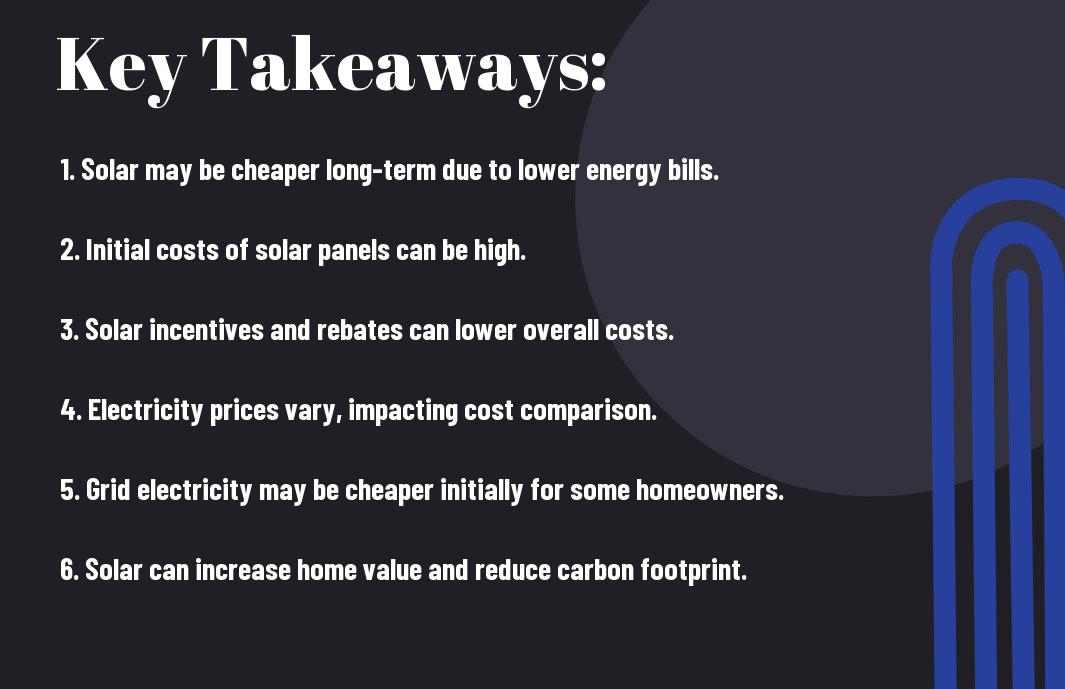There’s a growing trend towards solar power for homes, but is it worth the investment for you? In this informative blog post, we research into the benefits and considerations of installing solar panels on your property. By the end, you’ll have a clearer understanding of whether solar power is a viable option for your home.
Key Takeaways:
- Cost Savings: Investing in solar power can lead to significant cost savings on your electricity bills over the long term.
- Environmental Impact: Solar power is a clean and renewable energy source that reduces carbon emissions and helps protect the environment.
- Energy Independence: Producing your own solar power can provide a sense of energy independence and reduce reliance on the grid.
- Government Incentives: Many governments offer incentives, such as tax credits or rebates, to encourage the adoption of solar power in homes.
- Property Value: Installing solar panels can increase the resale value of your home, making it a worthwhile long-term investment.
Benefits of Solar Power
Environmental Advantages
Before you decide if solar power is worth it for your home, consider the environmental advantages. By installing solar panels, you can significantly reduce your carbon footprint and decrease your reliance on fossil fuels. Solar power is a renewable energy source that produces no greenhouse gas emissions or air pollutants during operation. If you are unsure if your house is a good candidate for solar panels, you can find out more by checking Is My House a Good Candidate for Solar Panels?
Financial Incentives
Any discussion about the worth of solar power for your home should consider the financial incentives available. Many governments and local utilities offer financial incentives, such as rebates and tax credits, to help offset the upfront costs of installing solar panels. Additionally, by generating your electricity, you can potentially lower or even eliminate your monthly electricity bills. These financial benefits can make solar power a smart investment for your home.
Apart from government incentives, some solar companies offer financing options or leasing programs that require little to no money down, making solar power more accessible to homeowners. By taking advantage of these financial incentives, you can enjoy the long-term savings and benefits of going solar.
Costs and Investments
Initial Installation Costs
The initial installation costs of solar power for your home can vary depending on various factors such as the size of your home, the type of system you choose, and your location. Generally, the upfront costs of installing solar panels can be substantial. However, there are often government incentives and rebates available that can help offset some of these costs.
Ongoing Maintenance Expenses
On top of the initial installation costs, you should also consider the ongoing maintenance expenses associated with solar power. While solar panels are known for being low-maintenance, it’s crucial to factor in occasional costs for things like cleaning, repairs, and monitoring to keep your system running efficiently.
Maintenance is crucial to ensure that your solar panels continue to operate at peak performance levels. While the maintenance costs are typically minimal compared to the savings you’ll enjoy, it’s crucial to budget for these expenses to get the most out of your solar investment.
Potential Savings
Solar power for your home can lead to significant potential savings in the long run. By generating your electricity, you can reduce or even eliminate your reliance on traditional utility companies, leading to lower monthly energy bills. Additionally, if your system produces more energy than you consume, you can sell the excess back to the grid through net metering programs, further increasing your savings.
Savings from solar power can also extend beyond your energy bills. Installing solar panels can increase the value of your home, making it a more attractive option for potential buyers if you decide to sell in the future. Additionally, by reducing your carbon footprint, you can contribute to a more sustainable environment for future generations.
Efficiency and Effectiveness
How Solar Panels Work
With advancements in technology, solar panels have become more efficient at converting sunlight into electricity for your home. Solar panels are made up of photovoltaic cells that absorb sunlight and convert it into direct current (DC) electricity. An inverter then converts the DC electricity into alternating current (AC) electricity that can power your home’s appliances and electronics.
Factors Affecting Energy Output
Factors that can affect the energy output of your solar panels include:
- The angle and orientation of your solar panels
- The amount of sunlight your location receives
- The presence of shading from trees or buildings
Perceiving and optimizing these factors can help maximize the energy output of your solar panels and increase the effectiveness of your solar power system.
Comparing Solar to Traditional Energy Sources
| Solar Energy | Traditional Energy Sources |
| Renewable and sustainable | Dependent on fossil fuels |
| Low maintenance and operating costs | High maintenance and operating costs |
| No greenhouse gas emissions | Contribute to air pollution and climate change |
Solar energy offers a clean and sustainable alternative to traditional energy sources like coal, oil, and natural gas. By harnessing the power of the sun, you can reduce your carbon footprint and lower your energy bills over time.
This comparison highlights the benefits of solar power in terms of sustainability, cost-effectiveness, and environmental impact. By opting for solar energy for your home, you can make a positive impact on the planet while enjoying long-term energy savings.
Suitability for Your Home
Assessing Your Energy Needs
The first step in determining if solar power is worth it for your home is assessing your energy needs. Consider how much electricity your household consumes on a daily and monthly basis. Take into account peak usage times and any energy-saving measures you can implement to reduce your overall consumption. This evaluation will give you a clear idea of how much solar power you will need to cover your energy needs effectively.
Evaluating Your Home’s Solar Potential
With advancements in solar technology, it’s easier than ever to evaluate your home’s solar potential. Factors such as roof orientation, tilt, and shading can impact the efficiency of your solar panels. Additionally, consider the amount of sunlight your location receives throughout the year. You can also consult with a professional solar installer to conduct a detailed assessment of your home’s solar potential.
It’s crucial to understand that not all homes are suitable for solar power systems. If your roof is heavily shaded or does not receive adequate sunlight, solar panels may not be a practical option for your home.
Considering Local Regulations and Policies
It’s crucial to consider local regulations and policies when evaluating the feasibility of solar power for your home. Some areas have specific zoning laws, building codes, or homeowner association restrictions that could impact your ability to install solar panels. Additionally, look into any available incentives, rebates, or tax credits for solar installations in your area. These financial benefits can make a significant difference in the overall cost-effectiveness of solar power for your home.
Evaluating the local regulations and policies will give you a comprehensive understanding of the requirements and potential roadblocks you may face when going solar.
Common Concerns and Misconceptions
Unlike The Pros and Cons of Solar Panels: Are They Worth It?, you may have some concerns and misconceptions about using solar power for your home. Let’s address a few of these below.
Addressing Intermittency and Energy Storage
With solar power, one common concern is the intermittent nature of sunlight. However, advancements in energy storage technology, such as batteries, have made it possible to store excess energy generated during sunny days for use when the sun is not shining. This means you can power your home with solar energy even when it’s dark or cloudy.
Debunking Myths about Solar Panel Efficiency
On the topic of solar panel efficiency, some myths may make you hesitant to switch to solar power. Rest assured, modern solar panels are highly efficient and can generate a significant amount of electricity even in less sunny conditions. Additionally, ongoing research and development in the solar industry continue to improve efficiency levels, making solar power an increasingly viable option for homeowners.
Debunking common misconceptions can help you make an informed decision about whether solar power is right for your home.
Exploring Battery Backup Options
Intermittency is a valid concern when it comes to solar power, as sunlight is not available 24/7. However, battery backup options can help you store excess energy generated by your solar panels for use during periods of low sunlight or at night. This added level of energy storage can provide peace of mind and ensure a reliable power supply for your home, even when the sun isn’t shining.
Misconceptions about the limitations of solar power can hinder you from fully understanding its potential benefits for your home. By exploring energy storage solutions like battery backups, you can maximize the efficiency and reliability of your solar power system.
Real-World Examples and Success Stories
Residential Solar Power Installations
Now, let’s take a look at some real-world examples of residential solar power installations. With advancements in technology and decreasing costs, more and more homeowners are choosing to invest in solar panels for their homes. By generating your own electricity from the sun, you can significantly reduce your electricity bills and even earn money by selling excess energy back to the grid.
Installing solar panels on your rooftop not only helps you save money in the long run but also allows you to reduce your carbon footprint and contribute to a more sustainable future. Many homeowners are finding that solar power is a worthwhile investment that pays off both financially and environmentally.
Community Solar Programs and Cooperatives
Examples of successful community solar programs and cooperatives demonstrate the power of collective action in adopting renewable energy solutions. Solar cooperatives allow a group of individuals or businesses to pool their resources to invest in a shared solar energy system. By joining forces, participants can benefit from economies of scale and access solar power without the need for rooftop installations.
Solar communities are popping up across the country, offering members the opportunity to support clean energy and enjoy the financial benefits of solar power without the need for individual system ownership. Participating in a community solar program is a convenient and cost-effective way to go solar, making it accessible to a wider range of people.
Innovative Applications and Emerging Trends
Installations of solar panels on unconventional surfaces such as carports, facades, and even roads are pushing the boundaries of traditional solar power systems. Plus, emerging trends like solar battery storage and smart home integration are making solar power even more attractive and versatile. By storing excess energy for later use and optimizing energy consumption, you can further maximize the benefits of solar power for your home.
To wrap up
Presently, after exploring the benefits of solar power for your home, you may find that investing in solar panels is worth it for various reasons. Not only can you save money on your energy bills in the long run, but you can also reduce your carbon footprint and contribute to a more sustainable future. Additionally, with the advancements in technology and the availability of government incentives, the initial cost of installing solar panels is becoming more affordable for homeowners.
Q: Is solar power worth it for my home?
A: Yes, investing in solar power for your home can be worth it in the long run. While there is an upfront cost involved, solar panels can help you save money on your electricity bills over time and even potentially earn you money through incentives like net metering or selling excess power back to the grid.
Q: How long does it take to recoup the cost of installing solar panels?
A: The payback period for a solar power system can vary depending on factors such as your location, energy usage, the cost of electricity in your area, and available incentives. On average, most homeowners recoup the cost of their solar panel installation within 5 to 10 years. After that, you can enjoy free or reduced-cost electricity for the remaining lifespan of the system, typically 25-30 years.
Q: What are the environmental benefits of using solar power for my home?
A: Using solar power for your home can have significant environmental benefits. By generating electricity from the sun, you can reduce your reliance on fossil fuels, lower your carbon footprint, and help combat climate change. Solar energy is clean, renewable, and sustainable, making it a more environmentally friendly alternative to traditional sources of electricity.







